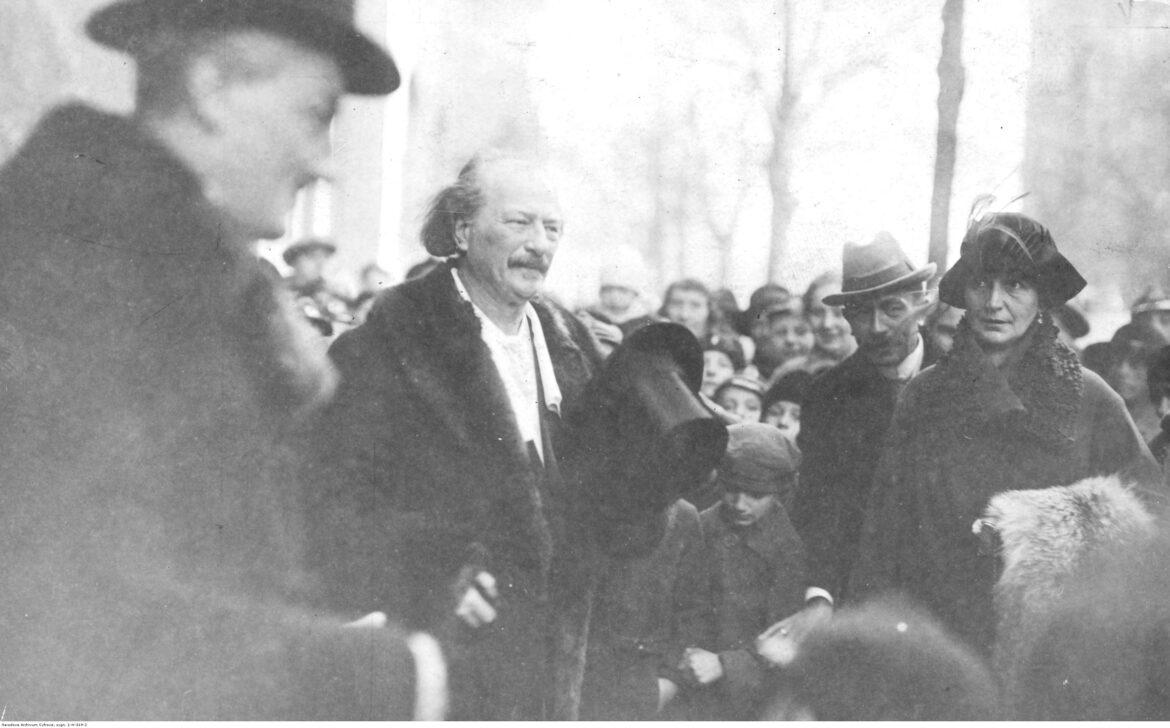Paderewski used his great musical talent and fame in the world to popularise Polish causes. He was a great patriot devoted to the idea of Poland’s independence.
Difficult youth
Ignacy Jan Paderewski was born on 6 November 1860 in the village of Kuryłówka in Podolia (today Ukraine). His childhood was sorrowful, as he lost his mother only a few months after his birth. He was brought up by his father Jan, a participant in the January Uprising and administrator of an estate in Podolia. After his death, Ignacy was cared for by his aunt.
Despite a difficult childhood, young Ignacy showed extraordinary musical talent. A great role in Paderewski’s education was played by Michał Babiński, a former participant in the November Uprising, who introduced him to the world of knowledge, culture, and literature.
At the age of 12, Ignacy began his studies at the Warsaw Institute of Music, the future Warsaw Conservatory. After completing his education with honours, Paderewski took up a job as a piano teacher.
In 1880, at the age of 20, he married Antonina Korsakówna. Their marriage, unfortunately, did not last long – a year later Antonina passed away, leaving Ignacy with his son Alfred, who had serious health problems. This painful loss was one of the reasons why Paderewski decided to go to Berlin for further musical training.
Acclaimed internationally
After moving to Berlin at the end of the 19th century, Paderewski undertook further musical education in Vienna under the renowned teacher Theodor Leschetizky. His debut concert in Vienna in 1887 was warmly received by listeners and music critics. Soon after, he was performing on the stages of major European cities.
However, the real turning point in his career happened during a tour of the USA in 1891. Americans were enchanted by his talent. His concerts drew crowds of thousands and the reviews were full of praise. In addition to his live performances, Paderewski also created his own compositions. His most acclaimed work was the opera ‘Manru’. He also wrote other works such as sonatas, short piano compositions, and songs.
He always kept Poland in mind
In 1908, at Paderewski’s request, the artist Antoni Wiwulski designed a monument to commemorate the Battle of Grunwald. Attended by 150,000 people, its ceremonial unveiling in Kraków became an expression of Polish patriotism. Paderewski seized the moment to speak with a message of Polish independence. It is worth recalling that at that time this country did not exist officially as in the 18th century, three powers: Russia, Prussia and Austria annexed Polish territories.
When the First World War came, Paderewski did not stand aside. Taking advantage of his international prestige, he became involved in efforts to revive Poland. In the United States, where he was highly respected, the artist organised charity concerts for victims of the conflict. In 1915, together with Henryk Sienkiewicz, he founded a committee in Switzerland to help the war victims in Poland.
His activity in the USA was not limited to performances. He made contact with a close associate of US President Woodrow Wilson, Edward House. In early 1917, he presented Wilson with a document on the future of Poland, outlining a vision of a sovereign country. His efforts contributed to the inclusion of the Polish question in Wilson’s famous 14 points.
After Poland regained its independence in 1918, Paderewski did not hesitate to take an active part in the country’s political life. In December of the same year, he arrived in Poznań, where he was received with enthusiasm by the local population. His arrival was of great significance for the outbreak of the Wielkopolska Uprising, which contributed to the incorporation of Wielkopolska into the reborn Poland.
Paderewski’s cooperation with Roman Dmowski, the leader of the Polish National Committee, was an important part of his diplomatic activities. Together, they represented Poland at the Paris Peace Talks in 1919, discussing the details of the Treaty of Versailles, ending the First World War.
On his return to his independent homeland, Paderewski took up the post of Prime Minister and Minister of Foreign Affairs. His tenure was short, but of significance to the young state. In December 1919, he resigned his post, but did not give up his public activity. In 1920, during the Polish-Soviet War, he represented Poland in the League of Nations.
Music and politics
In 1922, Ignacy Jan Paderewski decided to return to the USA, continuing his passion for music, combining it with charitable activities. When he played to a full Madison Square Garden audience in 1932, he decided to donate the entire proceeds of the concert to support financially disadvantaged musicians. In recognition of his contribution to culture, he received a knighthood from King George V of Great Britain.
After the death of Marshal Józef Piłsudski (1935), who had ruled Poland after the May coup since 1926, Paderewski became an important figure in Polish émigré circles. He was one of the founders of the Front Morges, a group in opposition to the Sanation (Piłsudski’s supporters), which sought to democratise Poland. Its objectives included supporting Paderewski as a candidate for President of the country.
After the start of the Second World War, he did not stop working for his homeland. He became leader of the National Council of the Polish Republic in London. In 1940, despite his failing health, he visited the USA, where he helped raise funds to support the Polish Armed Forces. His activity was so significant that he was placed on the list of enemies of the Third German Reich.
Unfortunately, Paderewski’s health was deteriorating. He passed away on 29 June 1941 at the Buckingham Hotel in New York.





